The story goes on
Following second round of negotiations in Rome, expert-level talks set for Wednesday in Muscat ahead of April 26 high-level meeting

TEHRAN – Iranian Foreign Minister Abbas Araghchi has highlighted that Iran and the United States have made significant progress in their ongoing indirect nuclear negotiations.
In remarks following the second round of talks in Rome on Saturday, he emphasized that both sides had reached a “better understanding” of certain principles and objectives.
The talks, which were mediated by Omani Foreign Minister Badr bin Hamad Al Busaidi, were held in the Omani capital of Muscat on April 12 and in Rome on April 19. These discussions, which are aimed at resolving the long-standing nuclear issues between Iran and the U.S., have involved high-level engagement from both sides, with the Iranian delegation led by Araghchi and the U.S. side represented by Steve Witkoff, Donald Trump’s special envoy for West Asia affairs.
At the close of the second round of talks in Rome, which lasted for over four hours, Araghchi expressed cautious optimism. He stated, "It was a good session with negotiations moving forward," signaling that while the discussions had yielded positive outcomes, there was still a long road ahead.
Araghchi confirmed that the delegations had agreed to continue their work and would meet again at expert level in Oman on April 23. A third round of high-level talks is scheduled for April 26 in Muscat.
The Iranian foreign minister underlined the importance of maintaining a careful approach. "We hope that after the expert-level sessions next week, we will be in a better position to assess the possibility of reaching an agreement," Araghchi added. However, he cautioned against speculating on the outcome before the talks had concluded, stating that the results would be clear once the negotiations reached a resolution.
“Speculations and personal interpretations with various agendas always exist in negotiations,” he said. “I do not confirm any of them. The outcomes will speak for themselves once we reach a result.”
He also stressed that the negotiation process should be treated with maturity and patience. “Negotiation is one of the tasks of the Foreign Ministry, and there is no need for hype or excitement. We are continuing our work with care and seriousness,” Araghchi remarked. “There is no reason for either excessive optimism or pessimism.”
A significant point of discussion during the talks was the potential involvement of the International Atomic Energy Agency (IAEA). In response to a question about the presence of IAEA Director General Rafael Grossi in Rome, Araghchi clarified that the agency’s role was not yet necessary. "We are not yet in a position that requires the presence of the agency," he explained, noting that the IAEA would be essential only if and when a final agreement is reached.
Despite Grossi’s visit to Rome, which was reportedly a separate initiative to meet with Italian officials, Araghchi emphasized that the focus of the indirect talks was strictly on nuclear issues. “Nothing other than building confidence regarding Iran's peaceful nuclear program, in exchange for the lifting of sanctions, is under discussion,” he asserted.
Sanctions removal at the forefront
During these talks, Iran has remained firm on its demands for the removal of "unlawful" sanctions. Foreign Ministry spokesman Esmaeil Baghaei reiterated on Saturday that Iran’s goal is to secure sanctions relief with strong guarantees. He emphasized that Iran is participating in the negotiations with "complete seriousness and readiness," but made it clear that any potential agreement must include reliable guarantees regarding the lifting of sanctions.
"Iran's nuclear program is completely peaceful," Baghaei stated. "Iran is ready to dispel any doubts in this regard." He also underscored that the talks would remain narrowly focused on nuclear issues, with no discussions on other topics.
The diplomatic efforts to resolve the nuclear issue come after a tumultuous period, including the United States’ withdrawal from the 2015 Joint Comprehensive Plan of Action (JCPOA) under President Trump in his first term.
Araghchi has stated that reaching an agreement with the United States is possible, provided Washington refrains from making "unrealistic" demands. "If they demonstrate seriousness and make reasonable demands, an agreement is within reach," he remarked.
The second round of talks, hosted in Rome, received praise for its constructive atmosphere. Araghchi also thanked Italy for its efforts to facilitate the negotiations, acknowledging their vital role in hosting the discussions. Ahead of the Rome talks, Araghchi held a meeting with his Italian counterpart, Antonio Tajani, to discuss mutual relations and regional developments.
Esmaeil Baghaei confirmed that the Iranian delegation had been fully committed to the talks. "Iran participated with complete seriousness," he remarked, emphasizing that the negotiations are crucial for restoring trust and finding a lasting solution.
Oman’s continued mediation: Moving to the next phase
In a statement, Oman’s Ministry of Foreign Affairs confirmed that both Iran and the United States have agreed to "enter the next phase of talks."
The ministry added that the goal of this new phase is to build upon the progress made and eventually "sign a fair nuclear agreement."
The envisioned agreement would ensure that Iran remains free from nuclear weapons while preserving its right to peaceful nuclear energy, and that all sanctions are lifted comprehensively and permanently.
The Omani Foreign Ministry stressed that dialogue and transparency are the only viable path forward. “A credible and reliable understanding will benefit all parties, regionally and internationally,” their spokesperson said.
The next round of expert-level talks is set to begin in Muscat on April 23, followed by a third high-level meeting on April 26.
Leave a Comment